Discovering a Lost Colony of Sanity
Jef Costello, American Renaissance, June 8, 2023
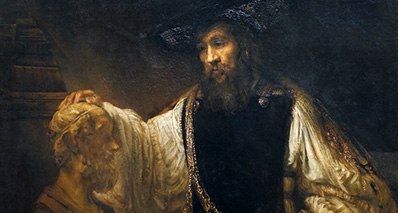
Subscribe to future audio versions of AmRen articles here.
Guillaume Durocher, The Ancient Ethnostate: Biopolitical Thought in Classical Greece, independently published, 2021, 268 pp.
What do white advocates have to learn from the ancients? Quite a lot, argues Guillaume Durocher, and he backs this up with abundant evidence from Ancient Greece. Drawing upon such authors as Homer, Hesiod, Herodotus, Thucydides, Plato, and Aristotle, Durocher offers a broad survey of their thoughts on such matters as hereditarianism, eugenics, national identity, the nature of the good life, the traits of an adaptive culture, and the causes of civilizational downfall. The volume begins with a lengthy foreword by Kevin MacDonald.
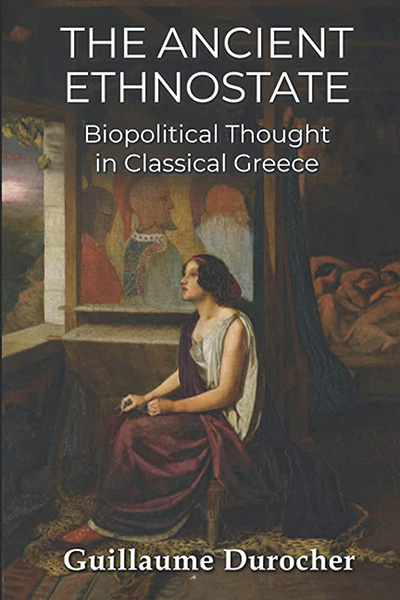
For the open minded, it is impossible not to come away from this volume with the impression that the wisdom of the ancients far exceeds our own. However, what we see as “wisdom” would, in many cases, have been seen in the not-so-distant past as plain common sense. For example, Mr. Durocher shows that one constant theme in all ancient discussions of community was the importance of the good of the whole, as opposed to the happiness and satisfaction of the individual.
“For the ancient Greeks,” Mr. Durocher writes, “political freedom was a holistic enterprise involving the entire community. They had no notion of individual liberty outside of the polis. The citizen in his capacity as a private individual was known as an idiōtēs, the semantic ancestor of our ‘idiot.’” Plato rejected the notion of a “private sphere” outside the realm of the political, and stated in his late dialogue, the Laws, that “the state’s general code of laws will never rest on a firm foundation as long as private life is badly regulated, and it’s silly to expect otherwise.”
Plato’s attitude was typical of the ancients. He did not think the individual had the “right” to live an unregulated private life, purely according to his own notions — and certainly didn’t think that the purpose of the polis was to secure “individual rights.” In the Politics, Aristotle comes down on the side of moderate democracy — but he nowhere justifies this by reference to freedom or the supposed rights of individuals. Instead, his arguments appeal to that which benefits the entire community. This approach follows from a basic metaphysical principle that Aristotle states in the same text: “A whole is never intended by nature to be inferior to a part.” The modern world has stood this on its head.
Mr. Durocher notes that Aristotle’s “community-centered” notion of justice may well be incomprehensible to many moderns. And he asks us to consider the striking fact that almost no political discussions today refer to the idea of the common good. Instead, issues such as abortion, gay marriage, immigration, “trans rights,” affirmative action, homosexuals in the military, reparations for slavery, and education reform are debated almost exclusively in terms of the language of “individual rights” and now “equity.” Try asking “but what about the good of the whole?” and you are very likely to be met with blank stares.
Of course, one of the major reasons for this is that it feels like there is no whole anymore. Throughout the West, but especially in the US, many people no longer have the sense of belonging to a larger community. Where one finds community, it is usually on the local level — the level of the small town or neighborhood. My parents had a very strong sense of belonging to a larger, national community. They were proud of being Americans and identified with their fellow countrymen, even those living in distant regions my parents would never meet, living quite different lives.
So far as I can tell, those feelings have now almost completely withered and died in the souls of most Americans. One of the causes of this, of course, is “diversity,” which has been shown to destroy social trust. Then there are our political divisions — but these, in fact, have a great deal to do with attitudes about diversity. As we shall see, the ancients anticipated the problems of the “multicultural society” and warned us about them. At root, this was because Greek civic life was fundamentally ethnopolitical.
Mr. Durocher writes that “Hellenic freedom meant participating in the collective flourishing of an organic community defined by shared blood and gods.” The Greeks, like other ancient peoples, were obsessed with kinship and genealogy. It was considered commonsense that families and nations exhibited inherited qualities, and that common kinship entailed solidarity.
In a striking passage from the Nicomachean Ethics, Aristotle tells us that shared blood is the basis both of familial love and of a shared sense of identity:
Parents, then, love their children as themselves (for their issue are by virtue of their separate existence a sort of other selves), while children love their parents as being born of them, and brothers love each other as being born of the same parents; for their identity with them makes them identical with each other (which is the reason why people talk of “the same blood,” “the same stock,” and so on). They are, therefore, in a sense the same thing, though in separate individuals.
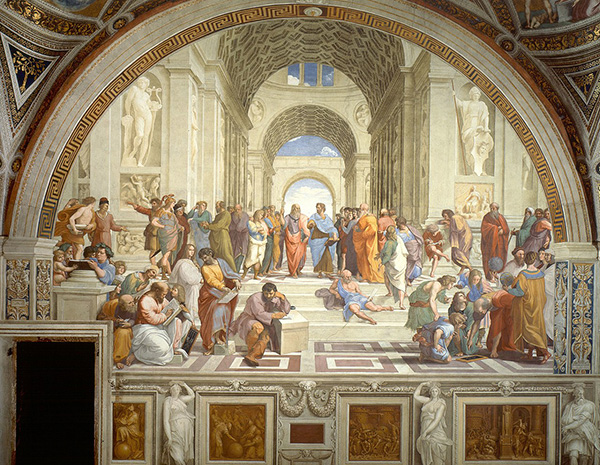
The School of Athens by Raphael
Herodotus’s Histories includes many stories in which blood ties are seen to be the basis of solidarity and moral obligation. Herodotus also extolls the virtue of filial piety, holding up the Persians as exemplars:
They say that no one has ever killed his own father or mother. They insist that all such incidents would inevitably be found on examination to have been the work of a child substituted for a genuine child, or of a bastard. They simply deny the plausibility of a full parent being killed by his own child.
Herodotus tells us further that the Persians put a high premium on large families:
After bravery in battle, manliness was proved above all by producing plenty of sons, and every year the king rewards the person producing the most; they think that quantity constitutes strength . . . They study only three things: horsemanship, archery, and honesty.
Indeed, figures such as Homer and Hesiod virtually defined the good man as one who produces plenty of children, and whose children prosper. The good society was understood to be one in which this was possible, and a ruler was judged on his ability to foster the conditions that would make it possible. Aristotle sums up the common Greek conception of the good life in a passage from his Rhetoric:
Gentle birth [i.e., aristocratic], a wide circle of friends, a virtuous circle of friends, wealth, creditable offspring, extensive offspring, and a comfortable old age; also the physical virtues (e.g. health, beauty, strength, size, and competitive prowess), reputation, status, good luck, and virtue.
Mr. Durocher cites one mainstream academic historian, Susan Lape, who argues that the Athenians placed so much emphasis on ancestry and kinship ties, it is reasonable to claim that they based their democracy on an early conception of “racial citizenship.” This is apparent from the questions posed to those being considered for public office, listed in a work of disputed authorship called the Athenian Constitution:
When they are examined, they are asked, first, “Who is your father, and of what deme [district or village]? Who is your father’s father? Who is your mother? Who is your mother’s father, and of what deme?” Then the candidate is asked whether he possesses an ancestral Apollo or a household Zeus, and where their sanctuaries are; next if he possesses a family tomb, and where; then if he treats his parents well, and pays his taxes, and has served on the required military expeditions.
Given their emphasis on heredity and kinship ties, it is no surprise that the Greeks practiced eugenics. This 19thh-century coinage itself is from the Greek, meaning literally “good birth.” Without knowing anything at all about the science of genetics (also derived from a Greek word, genetikos), the ancients nevertheless had learned from bitter experience the importance of selective breeding (both of animals and of humans), as well as the importance of weeding out the congenitally weak or deformed.
The Spartan practice of killing malformed infants was widely discussed throughout the ancient world, and widely praised. Aristotle in the Politics advocates compulsory infanticide: “There should certainly be a law to prevent the rearing of deformed children.”
Durocher devotes considerable attention to the eugenic measures proposed by Socrates in the Republic. In brief, Socrates suggests that in the Kallipolis (the ideal state) men and women would not be allowed freely to marry and reproduce. Instead, the city’s philosopher-leaders would make matches according to sound eugenic principles. This fact, however, would be concealed from the people, who might find micromanagement of their sex lives intolerable.
Periodic “love lotteries” would be held, in which fertile young citizens would be deceived into thinking that they are paired with members of the opposite sex through chance. Once the women have been impregnated and given birth, their children would be taken away from them and reared by the state, on the principle that children are far too important a matter to be left to amateurs (i.e., parents).
Parents and children would not know each other in Socrates’s Kallipolis. Young people would call all adults old enough to be their parents “father” or “mother;” adults would call all children “my son” or “my daughter” (rather like the custom practiced between clergy and laity in the Catholic Church). These measures were to stop nepotism and to foster a strong social bond — one in which society would effectively become one large family.

The Acropolis at Athens by Leo von Klenze (1846)
There is a problem, however, with how to interpret Socrates’s proposals, and Mr. Durocher acknowledges this. Socrates often speaks ironically, and some of the dialogue’s proposals are supported by transparently bad arguments and pose seemingly insurmountable problems. As a consequence, Leo Strauss and others have put forward an interpretation of the Republic that claims Socrates’s actual purpose in the dialogue is to argue for the impossibility of an ideal society.
It is not plausible to think that everyone can simply be “educated” to accept the complete absence of sexual freedom, the surrender of children to the state, and living in ignorance of who their children are (unless there is an obvious resemblance — which is another problem with Socrates’s scheme — a back door through which nepotism could return). The truly radical proposals Socrates makes in the Republic all seem to go against the grain of human nature — as do all schemes for the creation of an ideal society. That is one of the most important lessons of the text — according to the Straussian interpretation, at any rate.
Still, even if Socrates and Plato were not serious about some of the more outlandish aspects of these eugenic proposals, it is highly implausible to believe that they were not advocates of eugenics as such. As we have already noted, a basic belief in the importance of eugenics was universal in the ancient world. And, as Mr. Durocher points out, Plato reiterates the importance of eugenics in his late dialogue, the Laws. Plato’s student, Aristotle, was also an advocate of eugenics.
Today we refer to “the Greeks” but, of course, for much of Greece’s early history there was not yet a unified country of Greece, only a collection of autonomous towns and cities, which were often at war with each other. Nevertheless, ancient sources make it clear that, whatever their differences, the Greeks had a sense of common racial or ethnic identity.
Already in the seventh century B.C., the Olympic Games attracted athletes from all across Greece. And Pan-Hellenic national identity is evident in the earliest Greek literature. Mr. Durocher cites as examples the Iliad, the Homeric Hymn to Apollo, and the Hesiodic Catalog of Women. In his comedy Lysistrata, Aristophanes depicts the women of Greece going on a sex strike, demanding that their men put an end to the Peloponnesian War (fought between Athens and Sparta and their allies), on the grounds that it is fratricidal. Aristophanes reproaches Greeks for fighting each other, despite “sprinkling altars with the same holy water like kinsmen at Olympia, Pylae, and Pytho.”
Perhaps most striking of all is a speech quoted by Herodotus in which the Athenians pledged to the Spartans that they would keep fighting their common enemy, the Persians:
We are all Greeks — one race speaking one language, with temples to the gods and religious rites in common, and with a common way of life. It would not be good for Athens to betray all this shared heritage. So if you didn’t know it before, we can assure you that so long as even a single Athenian remains alive, we will never come to terms with Xerxes.
Here we have, as Durocher puts it, a “powerful working definition of nationhood”: shared blood, religion, language, and custom.
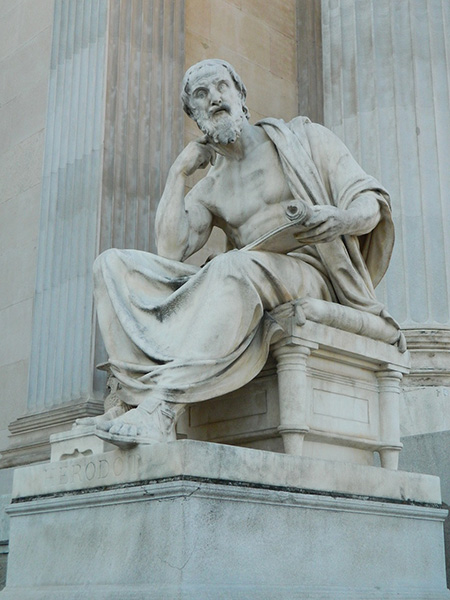
Herodotus
It is therefore unsurprising that the Greeks rejected any notion of “multiculturalism.” As an ideology, multiculturalism had not really been formulated in the ancient world (the closest thing to it was the “cosmopolitanism” of the Cynics and Stoics). But the Greeks were aware of the danger of letting alien stock into a homogeneous society.
As is well known, the Greeks referred to all other peoples as “barbarian” (barbaros). This word is thought to be onomatopoeic: to the Greeks, the speech of foreigners apparently sounded like “bar bar,” i.e., an incomprehensible gibberish (compare the English “blah blah”).
However, the Greeks were also far from being naïve cultural chauvinists. Herodotus famously noted that “King Custom” (nomos) rules in all societies, and that all societies tend to think their own customs are superior to those of others. He thus asserted a kind of cultural relativism, recognizing that feelings of cultural superiority (sometimes quite groundless) are found in all societies.
Because cultural differences are often radical, “King Custom” tends to polarize human beings into groups incapable of comprehending each other, who often find each other’s cultures repulsive. Herodotus gives as an example the difference between how Greeks and Indians treat the dead: the Greeks burn their corpses whereas the Indians (so Herodotus had heard) eat theirs.
For Herodotus, it follows as an obvious consequence that peoples with markedly different customs inevitably come into conflict if they live together. That this simple and obvious truth is today either forgotten or dismissed is largely attributable to the tendency of W.E.I.R.D. people (Western, educated, industrialized, rich, and democratic) to project their own values onto the rest of the world. They talk a great deal about “diversity” but fail to see just how diverse it actually is.
In the Politics, Aristotle has much to say about the dangers of mixing peoples that is uncannily relevant to our situation — especially when he cites examples of “replacement.” Mr. Durocher quotes one passage at length:
Heterogeneity of stocks may lead to faction — at any rate until they have had time to assimilate. A city cannot be constituted from any chance collection of people, or in any chance period of time. Most of the cities which have admitted settlers, either at the time of their foundation or later, have been troubled by faction. For example, the Achaeans joined with settlers from Troezen in founding Sybaris, but expelled them when their own numbers increased; and this involved their city in a curse. At Thurii the Sybarites quarreled with the other settlers who had joined them in its colonization; they demanded special privileges, on the ground that they were the owners of the territory, and were driven out of the colony. At Byzantium the later settlers were detected in a conspiracy against the original colonists, and were expelled by force; and a similar expulsion befell the exiles of Chios who were admitted to Antissa by the original colonists. At Zancle, on the other hand, the original colonists were themselves expelled by the Samians whom they admitted. At Apollonia, on the Black Sea, factional conflict was caused by the introduction of new settlers; at Syracuse the conferring of civic rights on aliens and mercenaries, at the end of the period of the tyrants, led to sedition and civil war; and at Amphipolis the original citizens, after admitting Chalcidian colonists, were nearly all expelled by the colonists they had admitted.
Aristotle argues, furthermore, that a diverse population without any shared identity is easier to enslave. In fact, in the Laws, Plato had argued that if the agricultural slaves of Magnesia (his hypothetical state) are to submit to their condition “they should not all come from the same country or speak the same tongue, as far as can be arranged.” Ethnic solidarity amongst the slaves would increase the likelihood of revolt. (Aristotle later made the same point.)
Of course, the same policies could be applied to the general population, if one wanted to make it easier to subjugate. Thus, it was a common practice of tyrants in the ancient world to try to undermine the cohesiveness of their own people by importing foreigners. In the Politics, Aristotle notes that:
Kings are guarded by the arms of their subjects; tyrants by a foreign force. Ruling according to law, and with the consent of their subjects, kings have bodyguards drawn from their subjects: the tyrant has a [foreign] bodyguard to protect himself against them.
For those who have not studied the Greek classic authors in any depth, reading The Ancient Ethnostate will be like discovering a lost continent of sanity. Even for those already well versed, Mr. Durocher has performed a real service in collecting in one place, whether through quotation or commentary, the most significant passages in Greek literature that we would recognize as “ethnonationalist.”
And the foregoing summary has left out quite a bit, including Mr. Durocher’s discussion of the refreshing inegalitarianism of Greek ethics, as well as the theories of Herodotus, Plato, and others on how societies decay. One of the highlights of the book is the author’s six-pronged analysis of the traits of an adaptive culture, derived from his study of Greek thought.
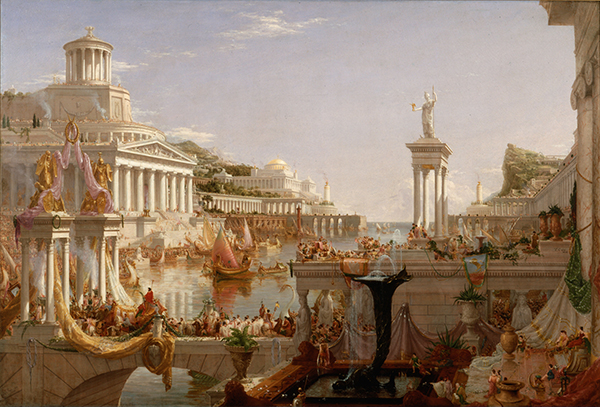
The Consummation of Empire by Thomas Cole (1836)
In the modern world, ethnonationalism is a revolutionary ideology, at least when promulgated by whites. In the ancient world, it was common sense. Our revolution is therefore inescapably a conservative one, since we are really aiming to recover what has been lost, rather than trying to establish something fundamentally new (which is the aim of all left-wing revolutions).
The Ancient Ethnostate is a sobering lesson in just how much has been lost. But lamenting this is not the purpose of the book: Mr. Durocher reminds us on every page of the capacity of ancient authors to inspire us. We must see these texts from the past as beacons lighting the way to our future.















